|
|
|
Sort Order |
|
|
|
Items / Page
|
|
|
|
|
|
|
| Srl | Item |
| 1 |
ID:
145105
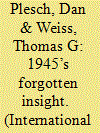

|
|
|
|
|
| Summary/Abstract |
The 70th anniversary of the signing and entry into force of the UN Charter provided an occasion to explore the historical underpinnings of contemporary global governance. This article redresses the neglect of the United Nations as a multilateral structure before the conference that drafted the Charter in 1945. It rehabilitates an underappreciated aspect of the period that began on January 1, 1942, with the “Declaration by United Nations,” namely, the combination of multilateral strategies for military and human security to achieve victory in war and peace. The wide substantive and geographic resonance suggests the extent to which the pressures of the second war to end all wars helped states to overcome their disinclination to collaborate. Today’s fashionable calls for “good enough” global governance abandon the strategy of constructing robust intergovernmental organizations; they are not good enough, especially, because our forebears did much better. Many insights and operational approaches from 1942 to 1945 remain valid for addressing twenty-first-century global challenges.
|
|
|
|
|
|
|
|
|
|
|
|
|
|
|
|
| 2 |
ID:
183760
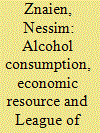

|
|
|
|
|
| Summary/Abstract |
Syria and Lebanon were declared French mandates by the League of Nations just after the First World War at the climax of a global prohibition, especially in the United States. Contrary to North Africa, Levant was already a great land of wine and arak production, especially through religious congregations. In that context, especially during the 1930s crisis, the French authorities were asked to protect and sustain the Lebanese vineyards, and more generally the alcohol levant economy. However, at the same time the administrators were pressured by Muslim lobbies and the League of Nations to ‘improve the social situation’ in the territories they had to manage, which could mean a stronger control of alcohol consumptions. In that context, alcohol regulation was a part of the paternal Republicanism that, according to Elizabeth Thompson, characterized the social policy of France in the Levant. How could the authorities manage these two different stakes? To try to answer, I have analysed the Lebanon newspapers from the nineteen-twenties in Saint-Joseph University and special issues on alcohol control, from French security services of the mandate, at the French Diplomatic Archives of Nantes (CADN).
|
|
|
|
|
|
|
|
|
|
|
|
|
|
|
|
| 3 |
ID:
181941
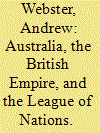

|
|
|
|
|
| Summary/Abstract |
This article reviews the most recent volume in the series of archival document collections on the history Australia’s external affairs, Documents on Australian Foreign Policy, covering the years 1920 to 1930. It focuses upon two main themes of central importance to the Australian global presence in that decade: the organisation and purposes of the Empire-Commonwealth and the impact of the League of Nations.
|
|
|
|
|
|
|
|
|
|
|
|
|
|
|
|
| 4 |
ID:
103889
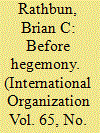

|
|
|
|
|
| Publication |
2011.
|
| Summary/Abstract |
Rationalist accounts of international cooperation maintain that states create international institutions to solve problems of distrust. They rest on a particular notion of trust, a strategic variety in which states trust based on information about others' interests. I seek to overturn this conventional wisdom. Drawing on social psychology, I point to the importance of generalized trust, an ideological belief about the trustworthiness of others in general. Generalized trust precedes institution-building and serves as a form of anarchical social capital, facilitating diffuse reciprocity and allowing state leaders to commit to multilateralism even in cases that rationalists deem inhospitable to cooperation and without the institutional protections that rationalists expect. In case studies of U.S. policy on the creation of the League of Nations and the United Nations, I demonstrate that generalized trust is necessary for explaining the origins of American multilateralism and the design of these organizations.
|
|
|
|
|
|
|
|
|
|
|
|
|
|
|
|
| 5 |
ID:
144960
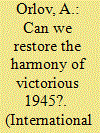

|
|
|
|
|
| Summary/Abstract |
THE 70TH ANNIVERSARY of the United Nations Organization is an international event of signal importance. Set up as a fundamental element of the international system, the UN remains its cornerstone with no alternatives no matter what its numerous critics are saying in chorus. Today amid the disarray and contradictions of the contemporary world, mankind, if confronted with the task of setting up a universal international structure to preserve peace and security, would have come up with an indifferent result if not a failure. Critics concentrate at individual aspects of the UN activity and talk about details: they stand too close to be aware of the grandiose panorama of this construction, hence their attention to arches and façades
|
|
|
|
|
|
|
|
|
|
|
|
|
|
|
|
| 6 |
ID:
171729
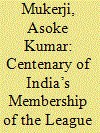

|
|
|
|
|
| Summary/Abstract |
The League of Nations (LN) was conceptualized by the Treaty of Versailles,1
which formally ended the First World War on 28 June 1919. The Treaty also
created the International Labour Organization (ILO), a unique multi-stakeholder
multilateral structure in which policies are decided by governments, employers
and workers, without any government exercising veto power
|
|
|
|
|
|
|
|
|
|
|
|
|
|
|
|
| 7 |
ID:
161305
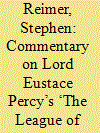

|
|
|
| 8 |
ID:
116644
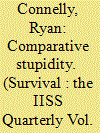

|
|
|
|
|
| Publication |
2012.
|
| Summary/Abstract |
It seems unlikely that a statesman like Georges Clemenceau could be elected in the West today. The son of a political activist, Clemenceau was sent to Paris for an education in medicine, but quickly became immersed in radical politics. He wrote for and founded several journals that attacked the regime of Napoleon III. He served one 73-day stint in prison, decided that was enough, and sought refuge in America just after he received his medical licence. He returned to France after its loss in the Franco-Prussian war, participated in the Paris Commune, and was one of the intellectual leaders of the movement to revenge the loss to Germany known as revanchisme. Early on, he was nicknamed 'Le Tigre' after his fierce style of debate, a reputation that followed him all the way to the office of prime minister.
|
|
|
|
|
|
|
|
|
|
|
|
|
|
|
|
| 9 |
ID:
191904
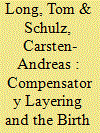

|
|
|
|
|
| Summary/Abstract |
International organizations come in many shapes and sizes. Within this institutional gamut, the multipurpose multilateral intergovernmental organization (MMIGO) plays a central role. This institutional form is often traced to the creation of the League of Nations, but in fact the first MMIGO emerged in the Western Hemisphere at the close of the nineteenth century. Originally modeled on a single-issue European public international union, the Commercial Bureau of the American Republics evolved into the multipurpose, multilateral Pan American Union (PAU). Contrary to prominent explanations of institutional genesis, the PAU's design did not result from functional needs nor from the blueprints of a hegemonic power. Advancing a recent synthesis between historical and rational institutionalism, we argue that the first MMIGO arose through a process of compensatory layering: a mechanism whereby a sequence of bargains over control and scope leads to gradual but transformative institutional change. We expect compensatory layering to occur when an organization is focal, power asymmetries among members of that organization are large, and preferences over institutional design diverge. Our empirical and theoretical contributions demonstrate the value a more global international relations (IR) perspective can bring to the study of institutional design. international relations (IR) scholars have long noted that international organizations provide smaller states with voice opportunities; our account suggests those spaces may be of smaller states’ own making.
|
|
|
|
|
|
|
|
|
|
|
|
|
|
|
|
| 10 |
ID:
186691
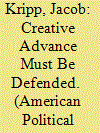

|
|
|
|
|
| Summary/Abstract |
This paper argues that the idea of global peace in early twentieth-century liberal international order was sutured together by the threat of race war. This understanding of racial peace was institutionalized in the League of Nations mandate system through its philosophical architect: Jan Smuts. I argue that the League figured in Smuts’s thought as the culmination of the creative advance of the universe: white internationalist unification and settler colonialism was the cosmological destiny of humanity that enabled a racial peace. In Smuts’s imaginary, the twin prospect of race war and miscegenation serves as the dark underside that both necessitates and threatens to undo this project. By reframing the problem of race war through his metaphysics, Smuts resolves the challenge posed by race war by institutionalizing indirect rule and segregation as a project of pacification that ensured that settlement and the creative advance of the cosmos could proceed.
|
|
|
|
|
|
|
|
|
|
|
|
|
|
|
|
| 11 |
ID:
114152
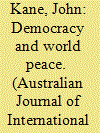

|
|
|
|
|
| Publication |
2012.
|
| Summary/Abstract |
When liberal democracies pursue idealistic goals they invite accusations of naivety and impracticality; if they act on strictly realistic premises they are accused of hypocrisy or betrayal of ideals. The author explores the consequences of this idealism-realism dilemma using the example of United States foreign policy and the particular case of Woodrow Wilson and the Covenant of the League of Nations. The author examines its theoretical roots by analysing the work of Immanuel Kant, who laid down the influential moral-political ideal of a democratic peace but posited so stark a theoretical gulf between morality and politics as to make the ideal seem unreachable. Kant tried to show how a world resistant to morality might nevertheless evolve towards one in which moral action had real political effect-a necessary condition, he believed, for an international federation of republics committed to peaceful coexistence. The implausibility of his account reveals the problematic nature of the idealism-realism divide, but also, in its attempt to bridge that divide, points the way towards a genuinely ethical-practical foreign policy founded in political prudence.
|
|
|
|
|
|
|
|
|
|
|
|
|
|
|
|
| 12 |
ID:
069397
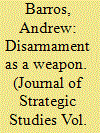

|
|
|
| 13 |
ID:
181019
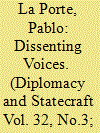

|
|
|
|
|
| Summary/Abstract |
This analysis explores the criticism about the creation of mandates in the League of Nations, particularly in the Secretariat; there, a number of officials questioned the organisation’s stance on this matter. Their critical views showed the crucial importance of the early debates in shaping the League’s nature and revealed the existence of a core group of eminent Secretariat members whose beliefs objected to the principles underlying the draft mandate provisions and the League’s tacit assent in their approval. These opinions highlighted administrative shortcomings in the League’s structure, particularly the Secretariat’s role and the ambiguous attitude of the secretary general, and foresaw the detrimental consequences that the mandates system would have for the League’s reputation. Some Secretariat members, who envisaged a more assertive role for the institution, vigorously challenged views on the League’s helplessness in the international post-war context that have come to predominate in current scholarship.
|
|
|
|
|
|
|
|
|
|
|
|
|
|
|
|
| 14 |
ID:
141089
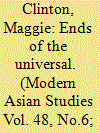

|
|
|
|
|
| Summary/Abstract |
Fascist Italy's 1935 invasion of Ethiopia and the League of Nations’ handling of the crisis resonated strongly in Nationalist China, where it recalled the League's failure to thwart Japan's claims to Manchuria in 1931. As these two crises unfolded, the League became a nexus around which Nationalist Party debates about the position of colonized and semi-colonized countries within the extant world order crystallized. Party adherents reflected on China's and Ethiopia's positions as independent nation states with limited territorial integrity or juridical autonomy, and assessed this situation in light of their respective League memberships. While party liberals continued to view the League as a flawed but worthwhile experiment in global governance, newly-emerged fascist activists within the party denounced it as an instrument for curtailing the sovereignty of weak nations. From these conflicting views of the League, it can be discerned how Nationalist disunity was partially grounded in disagreements over the nature and ideal structure of the global order, and how Chinese fascists agitated to escape from modern structures of imperialist domination while reiterating the latter's racial and civilizational exclusions.
|
|
|
|
|
|
|
|
|
|
|
|
|
|
|
|
| 15 |
ID:
084623
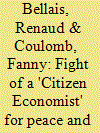

|
|
|
|
|
| Publication |
2008.
|
| Summary/Abstract |
John Maynard Keynes was a citizen economist, anxious to defend a capitalist system threatened by the rise of totalitarianism during the inter-war period. His criticism of the Versailles treaty in 1919 was supported by the idea of a link between economic prosperity and international peace. During the crisis of the 1930s, he advocated using the League of Nations for a peaceful settlement of international conflicts; while being in favour of economic interventionism, he criticised mercantilist policies. He recognised that military expenditure may be used as a reflationary policy, but after 1945 his theory was misused to promote the development of a 'defence-based' economic policy.
|
|
|
|
|
|
|
|
|
|
|
|
|
|
|
|
| 16 |
ID:
069394
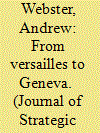

|
|
|
| 17 |
ID:
117796
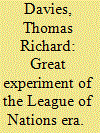

|
|
|
|
|
| Publication |
2012.
|
| Summary/Abstract |
This article aims to shed historical light on the contemporary debate concerning the role of international nongovernmental organizations and intergovernmental organizations in the democratization of global governance through an assessment of the experience and political thought of the League of Nations era. After introducing the interactions of international nongovernmental organizations and intergovernmental organizations in the present day and in the League of Nations period and the contemporary debate on their role in the democratization of global governance, the article discusses how democracy in global governance was conceived in the League of Nations era, with particular reference to the work of Alfred Zimmern. The analysis highlights not only the considerable continuities between interwar thought and that of the present day, but also the potential problems identified at the time that remain pertinent today.
|
|
|
|
|
|
|
|
|
|
|
|
|
|
|
|
| 18 |
ID:
110847
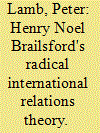

|
|
|
|
|
| Publication |
2011.
|
| Summary/Abstract |
Compared with some of his contemporaries Brailsford is relatively neglected today. He offered incisive analysis of the international relations of his times, discussing political and economic aspects together. He grounded his contributions upon a view of human nature that drew on the ideas of Godwin, Shelley and Condorcet. A cosmopolitan, socialist political philosophy also underpinned his work. Brailsford was sharply critical of balance-of-power theory, which served to veil the actual intentions of statesman and the capitalist entrepreneurs whose policies they benefited. He was also critical, like Laski, of sovereignty theory which masked the dominance of capitalist interests in the modern state and international system. Over several decades these aspects of his work contributed to his proposals for a radical league of nations. His work will be of interest to IR scholars today.
|
|
|
|
|
|
|
|
|
|
|
|
|
|
|
|
| 19 |
ID:
131433
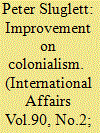

|
|
|
|
|
| Publication |
2014.
|
| Summary/Abstract |
The mandate system was created as part of the overall machinery of the League of Nations in an attempt to 'promote world peace' in the aftermath of the First World War. The 'A' mandates, with which this article is concerned, were the former Arab provinces of the Ottoman Empire that had been occupied and conquered by France and Britain by the end of the war. Was the mandate system in any sense an improvement on colonialism? To the extent that the period of foreign rule was rather short in comparison with other colonial regimes, one can perhaps say that it was. On the other hand, however high-minded its stated aims, the mandate system was a product of the imperial framework of its day, in which the white races were regarded as superior to the brown or black races. The supervisory instruments of the League (specifically the Permanent Mandates' Commission) were inadequate to deal with any shortcomings on the part of the mandatory, and there are a number of examples of situations where, for example, the legitimate interests of minorities were ignored to suit the wider interests of the powers. In general, the mandated states lacked institutional underpinning, and their immediate legacy was a string of weak states throughout the Arab world, where many of the institutions of civil society were destroyed in the course of military coups in the 1950s and 1960s.
|
|
|
|
|
|
|
|
|
|
|
|
|
|
|
|
| 20 |
ID:
039125
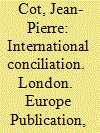

|
|
|
|
|
| Publication |
London, Europe Publication, 1968.
|
| Description |
xviii, 340p.
|
| Standard Number |
0900362405
|
|
|
|
|
|
|
|
|
|
|
|
Copies: C:1/I:0,R:0,Q:0
Circulation
| Accession# | Call# | Current Location | Status | Policy | Location |
| 010094 | 341.5/COT 010094 | Main | On Shelf | General | |
|
|
|
|
|
|
|
|
|